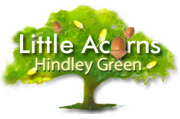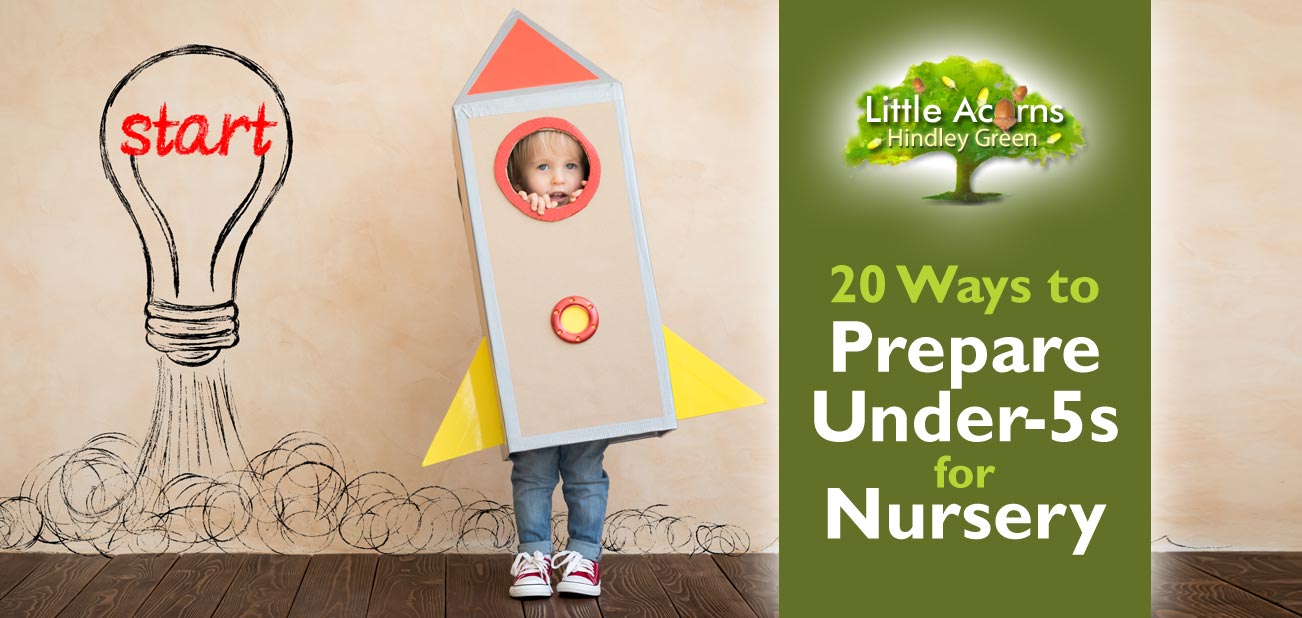
 Starting nursery or pre-school is a real milestone for children and parents alike. As well as being exciting, though, transitioning to nursery or pre-school can be daunting for the little ones. The researching of childcare settings, checking Ofsted reports and appraising recommendations from friends is all very well, but that’s only the first step. The transition will be smoother for the children themselves if a few golden rules are followed. That’s precisely where today’s guide comes in, with our 20 Ways to Prepare Under-5s for Nursery. Take a look.
Starting nursery or pre-school is a real milestone for children and parents alike. As well as being exciting, though, transitioning to nursery or pre-school can be daunting for the little ones. The researching of childcare settings, checking Ofsted reports and appraising recommendations from friends is all very well, but that’s only the first step. The transition will be smoother for the children themselves if a few golden rules are followed. That’s precisely where today’s guide comes in, with our 20 Ways to Prepare Under-5s for Nursery. Take a look.
20 Ways to Prepare Under-5s for Nursery or Pre-School.
1. Plan Well Ahead
One of the greatest tips is to plan well ahead. By planning ahead you can iron out many, if not all, of the things that may otherwise cause your child — or yourself — anxiety. Indeed, most of the tips that follow this one involve aspects of this pre-planning approach.
2. Arrange a Visit
 Arrange a visit of your chosen or short-listed nurseries/pre-schools. Good settings (like Little Acorns Nursery) will be happy to give you and your child a guided tour. It’s best to go during an actual session, so that you can both see the setting in action on a standard day. Bear in mind that it can also be a chance for your child to become more familiar with the setting. If they later go on to start at the nursery, they will then already be aware of what the rooms look like, where the toilets are, who their carers are, and so on. Show them the play areas inside and out and let them see the other children having fun.
Arrange a visit of your chosen or short-listed nurseries/pre-schools. Good settings (like Little Acorns Nursery) will be happy to give you and your child a guided tour. It’s best to go during an actual session, so that you can both see the setting in action on a standard day. Bear in mind that it can also be a chance for your child to become more familiar with the setting. If they later go on to start at the nursery, they will then already be aware of what the rooms look like, where the toilets are, who their carers are, and so on. Show them the play areas inside and out and let them see the other children having fun.
3. Stay for Lunch
When you visit, find out — and show your child — where they will eat lunch. Some nurseries allow prospective new children to stay over lunchtime and have lunch with their future classmates. It will be a good introduction to other children but also, for the parent, it is handy to know what sort of items other parents include in their children’s packed lunch or snack box. Or, if all meals and snacks are provided by the setting (they are at Little Acorns), ask for the weekly menu so you can explain to your child about the different types of meals they may receive.
4. Preparations Around Food & Eating
 There are several things you can also do around preparing your child for eating at nursery/pre-school. For starters, get your little one used to eating in a group of other children — perhaps with friends or related children at first. Also practise cutlery skills with your child, so they’re more able to eat independently when they start.
There are several things you can also do around preparing your child for eating at nursery/pre-school. For starters, get your little one used to eating in a group of other children — perhaps with friends or related children at first. Also practise cutlery skills with your child, so they’re more able to eat independently when they start.
If your child is having a packed lunch, they can give lots of valuable input into this and will then be more ‘at home’ with the foods on the actual day — because they partly chose it.
If the nursery supplies all meals, they may be able to provide you with either the menu plan or typical sample menus. Maybe practise some of the meals at home and then your child will be more familiar with the foods.
Make sure you have told the nursery setting about any food allergies or special dietary requirements that your child may have. That’s incredibly important.
Find out the setting’s policy for refrigerated food should you have to supply an item yourself, that needs refrigeration. That’s particularly important if supplying your own food/snacks/drink for children that require a special diet.
5. Settling In Sessions
Taking all of the above a stage further, some settings allow prospective new children to come for settling-in sessions, perhaps long before they officially start at the setting. They’ll get to know the staff, facilities and other children even better this way. They’ll also become accustomed to daily life at the setting and what to expect once they start.
6. Make Some Early Friends & Encourage Socialisation
 Pre-joining visits and settling-in sessions are a great way for children to make friends at the setting, but parents can also orchestrate this outside of the nursery or pre-school. For example, by finding out which friends and neighbours send their children to the setting, they can then suggest some play dates with those children. Little ones will then see one or more friendly little faces welcoming them, right from the outset, once they start at the setting. It’s a good opportunity for children to learn the art of socialising. It’s also good for parents to network in this way, so they can compare notes and perhaps pool information they might otherwise have missed.
Pre-joining visits and settling-in sessions are a great way for children to make friends at the setting, but parents can also orchestrate this outside of the nursery or pre-school. For example, by finding out which friends and neighbours send their children to the setting, they can then suggest some play dates with those children. Little ones will then see one or more friendly little faces welcoming them, right from the outset, once they start at the setting. It’s a good opportunity for children to learn the art of socialising. It’s also good for parents to network in this way, so they can compare notes and perhaps pool information they might otherwise have missed.
7. Ask Questions
Whether on visits, on the phone or via enquiry forms on nursery websites, it’s always a good idea for parents to ask staff questions that they may have. At Little Acorns Nursery in Hindley Green, for example, we’re always happy to answer questions, whether it’s about daily life, the curriculum, childcare funding, special diets or just about anything else. We’re here to help!
8. Talk With Your Child
Talk to your child about nursery, well ahead of them actually starting there. Discuss a visit you’ve made to the setting and ask your child if they have any questions, or concerns, and then address those. As the time to start gets closer, keep talking about nursery in the lead-up to it. This will get the little one used to the idea of being away from Mum or Dad and their home. Perhaps you have some photographs, a prospectus or even the setting’s website, which shows children at the nursery. Show your child these. Talk about what the children in the photos are doing, playing with or learning from. Make it all sound fun and exciting — because it really is!
Oh … and remember to talk with your child once they’ve started at the nursery. Ask them about their day and be sure to address any concerns they may have. Praise all their achievements too, no matter how small.
9. Toilet Training
 Whether your child is potty/toilet trained or still in nappies, teach them to help themselves in this type of area. If they are not yet toilet trained and are ready for it, begin to teach them. It’ll stand them in better stead once they start at nursery/pre-school. If they are newly toilet trained, though, reinforce that accidents do happen and that the childcare staff are used to it and will help change them if so.
Whether your child is potty/toilet trained or still in nappies, teach them to help themselves in this type of area. If they are not yet toilet trained and are ready for it, begin to teach them. It’ll stand them in better stead once they start at nursery/pre-school. If they are newly toilet trained, though, reinforce that accidents do happen and that the childcare staff are used to it and will help change them if so.
If they’re not yet ready for potty or toilet training and are still in nappies, get them to practise pulling up underwear garments, clothing etc.
10. Nurture Personal Hygiene
Ensure children know how and when to wash their hands. Explain the importance of handwashing and hygiene to them. This is important both from a social and health standpoint.
11. Nurture Independence
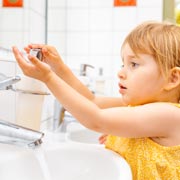 A little independence will go a long way for them once children start at nursery or pre-school. Personal hygiene and toilet training is just one of many things they can help themselves with if they’re shown how.
A little independence will go a long way for them once children start at nursery or pre-school. Personal hygiene and toilet training is just one of many things they can help themselves with if they’re shown how.
Get them used to doing the things they can do for themselves, like putting on and taking off coats and jumpers. Can your child take their socks and shoes off and put them back on again? This is handy for soft play or for spillages when socks or shoes are wet.
12. Prepare Clothing
Nearer the start date, plan outfits with your child, particularly for their first day and week. Perhaps your child has a favourite t-shirt or dress and wearing those on their first day may help them to be more confident in themselves. However, it’s important for your child to feel comfortable in their outfit too, so ensure outfits suit whatever is scheduled for the day at the nursery/pre-school — there may well be a variety of different activities lined up. Older children may indeed play outdoors as well as inside, so bear that in mind. They may need coats and even Wellington boots for outdoor play or external visits. They may need aprons for messy play. All such things need to be checked with the early years provider, well ahead. Also find out your childcare provider’s policy in regard to spare clothing should it be needed. Also, don’t forget to label your child’s clothing etc. with their name.
13. Introduce Educational Activities at Home
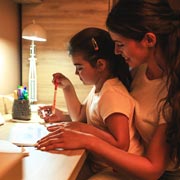 Childcare providers are more than just babysitters or a crèche. Settings like Little Acorn Nursery and many others offer a full early years education too. It’s very high quality, covering pretty much every aspect of early years learning and development and the all-important EYFS curriculum. It would be a great idea, then, for parents to get little ones used to some of the many learning, play and discovery activities associated with the EYFS while at home — before they start at their early years setting. Even just an introduction to the many different activities that they’ll encounter will help them once they start. In effect, they’ll have a little head-start and will find tasks easier. So, encourage practising at home. Introduce nursery rhymes, puzzles, building blocks, colouring and painting. Read them stories so they practise listening, concentrating and sitting still. Explain why we use an apron during messy or wet play. Introduce letter and number concepts if they’re advanced enough — and so on.
Childcare providers are more than just babysitters or a crèche. Settings like Little Acorn Nursery and many others offer a full early years education too. It’s very high quality, covering pretty much every aspect of early years learning and development and the all-important EYFS curriculum. It would be a great idea, then, for parents to get little ones used to some of the many learning, play and discovery activities associated with the EYFS while at home — before they start at their early years setting. Even just an introduction to the many different activities that they’ll encounter will help them once they start. In effect, they’ll have a little head-start and will find tasks easier. So, encourage practising at home. Introduce nursery rhymes, puzzles, building blocks, colouring and painting. Read them stories so they practise listening, concentrating and sitting still. Explain why we use an apron during messy or wet play. Introduce letter and number concepts if they’re advanced enough — and so on.
14. Embed the Routine
 In the month or weeks leading up to your child’s start date, it’s a great idea to try to mimic the timings at the nursery, so that the routine is pre-embedded. So, try to get them used to getting up and getting dressed etc. at the same time as the nursery and they can even have a restful nap at the same time as nap sessions at the setting. An appropriate bedtime routine is also important, so that your child is energised and not tired once they begin at the nursery.
In the month or weeks leading up to your child’s start date, it’s a great idea to try to mimic the timings at the nursery, so that the routine is pre-embedded. So, try to get them used to getting up and getting dressed etc. at the same time as the nursery and they can even have a restful nap at the same time as nap sessions at the setting. An appropriate bedtime routine is also important, so that your child is energised and not tired once they begin at the nursery.
15. Confirm Any Medical Issues
Have you advised the nursery about any medial issues, food allergies or disabilities that your child has? It’s important that they know.
16. Know Your Nursery Contacts
Have you the correct contact telephone numbers handy for the nursery? You need to know them (and they yours) and it’s best to add them to your mobile contacts list before your child starts. Ensure your mobile has sufficient battery each day in case you are held up or in case the nursery needs to contact you for any reason.
17. Drop-Off & Pick-Up
 Ensure that you are familiar with the pick-up and drop-off times as well as the nursery’s security arrangements should someone else be picking your child up instead of you.
Ensure that you are familiar with the pick-up and drop-off times as well as the nursery’s security arrangements should someone else be picking your child up instead of you.
18. Test the Route
Plan your journey before your child’s start date. It’s best to do this at the same time you’ll eventually be dropping off/picking up so that you know the correct timings. You don’t want to be late, especially on their first day, as that would simply cause stress for both you and your little one. Find out if there is there parking on site too.
19. Get Everything Packed The Night Before
You don’t want the first day to be stressful, so you and your child need to be ready to leave home in good time. Another way to ensure this is to pack their things the night before. As well as any spare clothing, perhaps include their favourite small cuddly toy or comforter in case they need it during their first day.
20. On the First Day, Be Calm
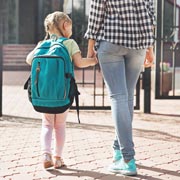 When the big day arrives for your child, don’t let on if you’re anxious or sad otherwise your child may pick up on it and become upset. So, keep it casual and don’t make a fuss when you drop them off for the first time. Staff and any friends they’ve previously made as part of your planning above are sure to welcome them. Chances are, they’ll run off into the nursery with a friend and have great fun right away anyway!
When the big day arrives for your child, don’t let on if you’re anxious or sad otherwise your child may pick up on it and become upset. So, keep it casual and don’t make a fuss when you drop them off for the first time. Staff and any friends they’ve previously made as part of your planning above are sure to welcome them. Chances are, they’ll run off into the nursery with a friend and have great fun right away anyway!
All in all, planning ahead with all these things will help to make this a fun, positive experience for both you and your little one. Chances are, your child will have an amazing first day at nursery!
A Warm Welcome at Little Acorns Nursery, Hindley Green
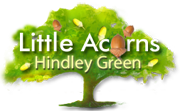
If you’re child is joining Little Acorns Nursery, our friendly, caring staff will be on hand to give your child a warm welcome and make them feel at home right away. If you have any doubts or concerns, we’re here at the end of a phone line, so you can always contact us with any queries or to check how they’re getting on. Little Acorns is a wonderful nursery & pre-school in Hindley Green and really will give your little one the very best start. We’re also located near to Wigan, Bickershaw, Leigh, Atherton, Westhoughton, Ince-in-Makerfield, Platt Bridge, Tyldesley, Bolton and Greater Manchester.
If you’re considering sending your child to Little Acorns Nursery, let us show you and your child around, so that you can see the nursery in action and witness, first hand, how happy and well cared-for children and babies are here. Please arrange a guided tour or register for a place below. We are also happy to answer any questions including those relating to the many childcare funding options that we support at the setting.


 Little Acorns Nursery in Hindley Green offers a first-class early years education and high-quality childcare for babies and children under five. Ours is a warm, welcoming, home-from-home environment where children feel loved, valued, and well cared for. With a learning and development programme that’s tailored to each child and a team of outstanding early years practitioners overseeing their care, we bring out the very best in every child. So, if you would like to give your child the very best start in life, consider Little Acorns Nursery for your child’s early years education and weekday childcare. Ofsted rates us as a ‘good’ provider and we support many different childcare funding options. At Little Acorns Nursery, your child will be in safe and capable hands.
Little Acorns Nursery in Hindley Green offers a first-class early years education and high-quality childcare for babies and children under five. Ours is a warm, welcoming, home-from-home environment where children feel loved, valued, and well cared for. With a learning and development programme that’s tailored to each child and a team of outstanding early years practitioners overseeing their care, we bring out the very best in every child. So, if you would like to give your child the very best start in life, consider Little Acorns Nursery for your child’s early years education and weekday childcare. Ofsted rates us as a ‘good’ provider and we support many different childcare funding options. At Little Acorns Nursery, your child will be in safe and capable hands.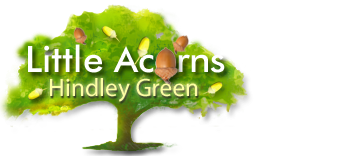


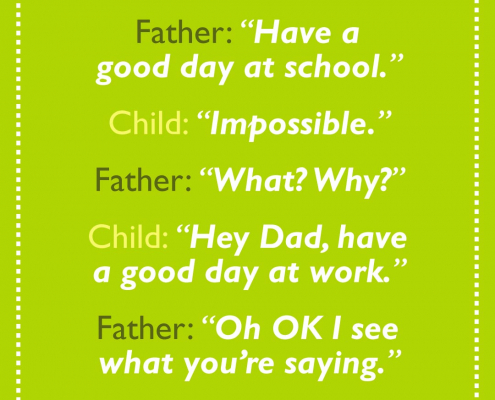
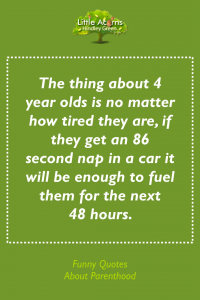





































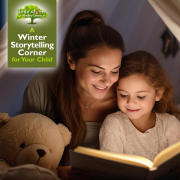
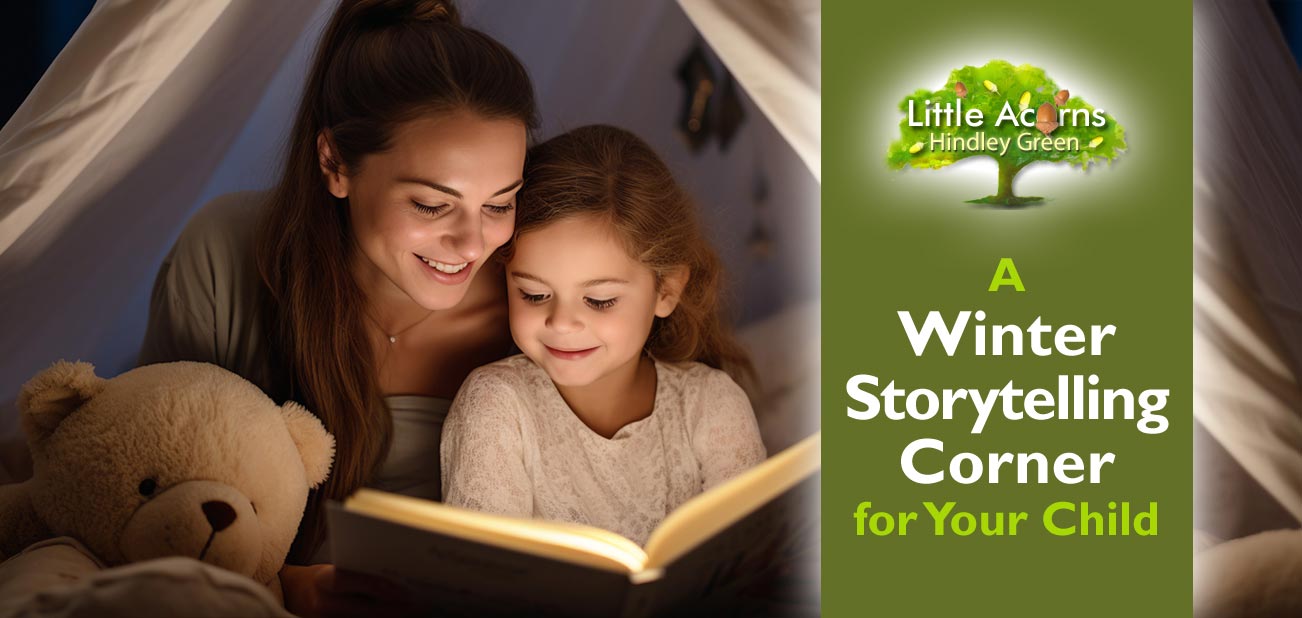
 Once winter arrives in December and cold winds start to breathe the landscape to sleep for a season, little ones will be less inclined to venture outdoors. Parents, too, will no doubt appreciate them avoiding the rain, cold, and inclement conditions that may occur. As such, winter is the perfect time to transform dreary days and dark evenings into a haven of warmth and cosiness indoors. An enchanting children’s activity that goes hand-in-hand with this is that of storytelling. With that in mind, today’s post guides you through the delightful process of creating a Winter Storytelling Corner tailored for the youngest members of the family. A storytelling corner is a wonderful way to make these winter nights cosy, magical, and filled with high-quality shared moments. Shared
Once winter arrives in December and cold winds start to breathe the landscape to sleep for a season, little ones will be less inclined to venture outdoors. Parents, too, will no doubt appreciate them avoiding the rain, cold, and inclement conditions that may occur. As such, winter is the perfect time to transform dreary days and dark evenings into a haven of warmth and cosiness indoors. An enchanting children’s activity that goes hand-in-hand with this is that of storytelling. With that in mind, today’s post guides you through the delightful process of creating a Winter Storytelling Corner tailored for the youngest members of the family. A storytelling corner is a wonderful way to make these winter nights cosy, magical, and filled with high-quality shared moments. Shared 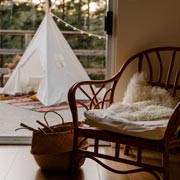 Start by selecting a cosy corner or nook in your home – for example, a secluded and quiet space somewhere that’s away from busy activity, cold draughts and suchlike. It will need to have somewhere comfortable for you and your child(ren) to sit or ‘nest’ once you get to the storytelling part. Once you’ve found somewhere suitable, it could be adorned with soft blankets, plush cushions, and perhaps even a few twinkling fairy lights. The goal is to create an inviting spot that beckons little ones and you, their parent or caregiver, to snuggle up and feel the warmth together as the winter tales unfold.
Start by selecting a cosy corner or nook in your home – for example, a secluded and quiet space somewhere that’s away from busy activity, cold draughts and suchlike. It will need to have somewhere comfortable for you and your child(ren) to sit or ‘nest’ once you get to the storytelling part. Once you’ve found somewhere suitable, it could be adorned with soft blankets, plush cushions, and perhaps even a few twinkling fairy lights. The goal is to create an inviting spot that beckons little ones and you, their parent or caregiver, to snuggle up and feel the warmth together as the winter tales unfold. Curate a collection of timeless winter stories that capture the spirit of the season. Consider classics like “The Snowman” by Raymond Briggs or “The Mitten” by Jan Brett. These stories, with their simple yet captivating narratives, are perfect for engaging young minds and sparking their imagination. These are just a couple of examples, though, and there are lots of winter-themed books to choose from, whether online, in book stores, in charity shops, or swapped amongst family or friends.
Curate a collection of timeless winter stories that capture the spirit of the season. Consider classics like “The Snowman” by Raymond Briggs or “The Mitten” by Jan Brett. These stories, with their simple yet captivating narratives, are perfect for engaging young minds and sparking their imagination. These are just a couple of examples, though, and there are lots of winter-themed books to choose from, whether online, in book stores, in charity shops, or swapped amongst family or friends. Perhaps incorporate simple props that relate to the story. If the tale involves animals, have soft toy animals on hand for little ones to interact with as the story unfolds. Other alternatives are hand puppets and finger puppets. Try using them to act out characters from the stories as you read them, or get your child to do so. Adding an interactive and visual element in this way will encourage children to participate actively and immerse themselves in the storytelling process. This approach can be creative, captivating, and sometimes even comical. As such, this is very entertaining for children and will help to make the whole activity enjoyable and fulfilling.
Perhaps incorporate simple props that relate to the story. If the tale involves animals, have soft toy animals on hand for little ones to interact with as the story unfolds. Other alternatives are hand puppets and finger puppets. Try using them to act out characters from the stories as you read them, or get your child to do so. Adding an interactive and visual element in this way will encourage children to participate actively and immerse themselves in the storytelling process. This approach can be creative, captivating, and sometimes even comical. As such, this is very entertaining for children and will help to make the whole activity enjoyable and fulfilling.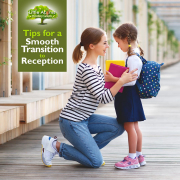
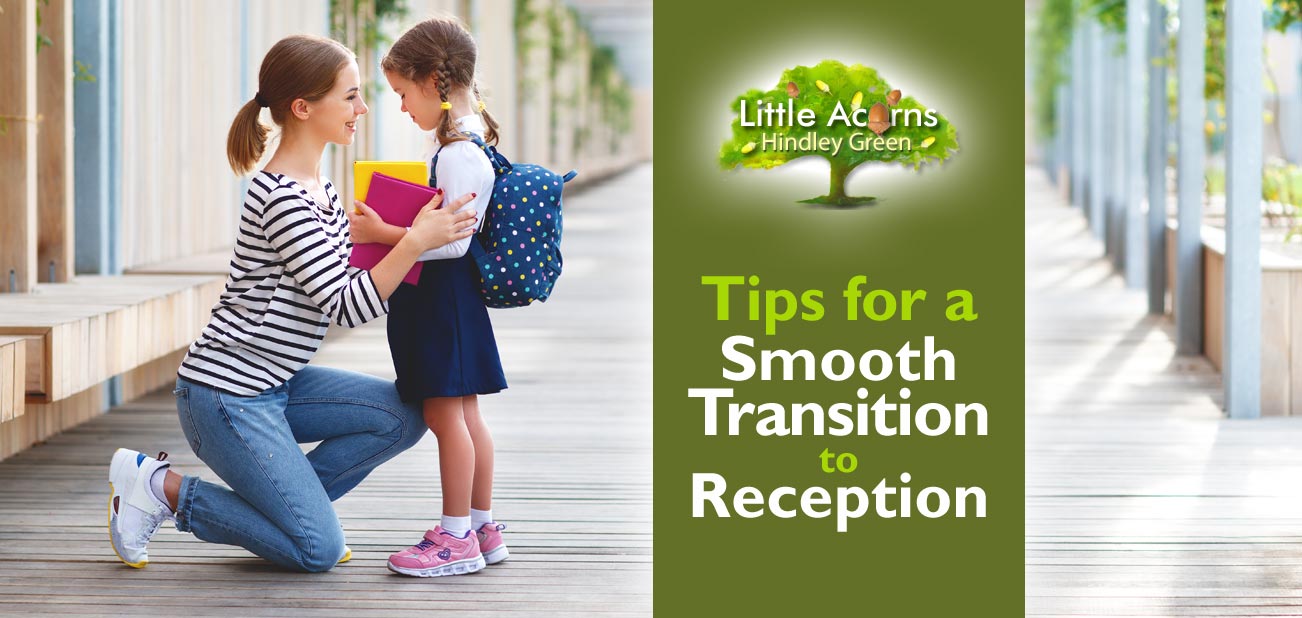
 The transition from preschool to Reception marks a significant milestone in any child’s life. It can be emotional for parents and, for children, it can be a period filled with excitement, curiosity, and perhaps a bit of apprehension. Ensuring a smooth transition involves a combination of careful planning, practical strategies and emotional support. With that in mind, today’s guide outlines more than twenty simple, actionable ways to ensure your child has a seamless transition and a positive start to school life.
The transition from preschool to Reception marks a significant milestone in any child’s life. It can be emotional for parents and, for children, it can be a period filled with excitement, curiosity, and perhaps a bit of apprehension. Ensuring a smooth transition involves a combination of careful planning, practical strategies and emotional support. With that in mind, today’s guide outlines more than twenty simple, actionable ways to ensure your child has a seamless transition and a positive start to school life. Use positive reinforcement to create a positive association with the idea of school. For example, highlight the exciting aspects of learning, making friends, playing new games, and discovering new things.
Use positive reinforcement to create a positive association with the idea of school. For example, highlight the exciting aspects of learning, making friends, playing new games, and discovering new things. Organise play dates with future classmates to build social connections before the first day. Encourage interactions with other children to develop essential social skills. Attending a nursery, preschool, or playgroup will provide excellent opportunities for this.
Organise play dates with future classmates to build social connections before the first day. Encourage interactions with other children to develop essential social skills. Attending a nursery, preschool, or playgroup will provide excellent opportunities for this.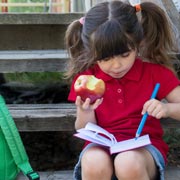 Foster self-reliance by allowing your child to perform simple tasks like dressing themselves, tidying up, using the toilet, and organising themselves. Also, assign small responsibilities to them at home to instil a sense of accountability and responsibility. Such skills will serve them well once at school.
Foster self-reliance by allowing your child to perform simple tasks like dressing themselves, tidying up, using the toilet, and organising themselves. Also, assign small responsibilities to them at home to instil a sense of accountability and responsibility. Such skills will serve them well once at school.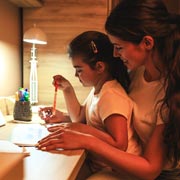 Read age-appropriate books together, particularly those that introduce topics they’ll be introduced to in Reception class. This not only sparks excitement and teaches them new things but also helps children understand what to expect. Instil a love for reading through interactive reading sessions. Visit the library too and explore a variety of books.
Read age-appropriate books together, particularly those that introduce topics they’ll be introduced to in Reception class. This not only sparks excitement and teaches them new things but also helps children understand what to expect. Instil a love for reading through interactive reading sessions. Visit the library too and explore a variety of books. Ensure that your child understands basic time concepts, such as morning, afternoon, and evening. This, in tandem with our next tip below, will help your child better understand the structure of the school day.
Ensure that your child understands basic time concepts, such as morning, afternoon, and evening. This, in tandem with our next tip below, will help your child better understand the structure of the school day. Ensure your child can manage basic self-care tasks independently. Such skills will be invaluable to them once they have started school.
Ensure your child can manage basic self-care tasks independently. Such skills will be invaluable to them once they have started school. Ensure sufficient sleep by establishing a calming bedtime routine. This not only gets them used to a pattern but will also help them to maintain focus and energy levels once at school.
Ensure sufficient sleep by establishing a calming bedtime routine. This not only gets them used to a pattern but will also help them to maintain focus and energy levels once at school. The journey from preschool to the first day of school is a significant milestone for both parent and child. Preparing children for school involves a holistic approach that addresses emotional, social, and practical aspects. By incorporating these strategies into your family’s daily routine, you can contribute to a positive and confident transition for your child and set the stage for the most successful start to their school journey.
The journey from preschool to the first day of school is a significant milestone for both parent and child. Preparing children for school involves a holistic approach that addresses emotional, social, and practical aspects. By incorporating these strategies into your family’s daily routine, you can contribute to a positive and confident transition for your child and set the stage for the most successful start to their school journey.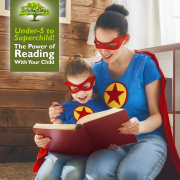
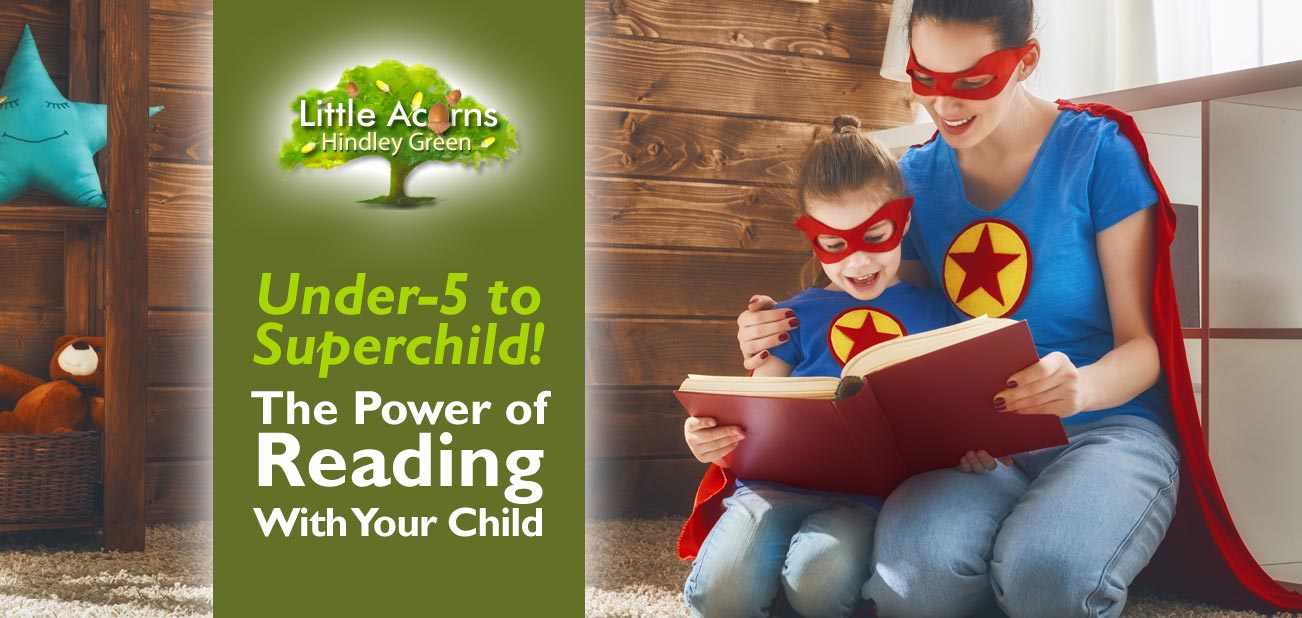
 In the journey of childhood development, there is a simple yet powerful tool that supercharges learning, imagination and even life outcomes: reading with your child. While a magical connection with books is a cherished tradition in many families, it is also a proven way to optimise a child’s cognitive and emotional development — and even to give some a social boost. With that in mind, we explore today the incredible benefits of reading with children in the early years and learn how study after study has proven how transformational it is to their lives.
In the journey of childhood development, there is a simple yet powerful tool that supercharges learning, imagination and even life outcomes: reading with your child. While a magical connection with books is a cherished tradition in many families, it is also a proven way to optimise a child’s cognitive and emotional development — and even to give some a social boost. With that in mind, we explore today the incredible benefits of reading with children in the early years and learn how study after study has proven how transformational it is to their lives. One of the most notable benefits of early reading is the rapid expansion of a child’s vocabulary. Indeed, research suggests that children who are exposed to a diverse range of words in books tend to perform better in language assessments, spelling, and overall literacy development. With reading to children opening up whole new worlds of information and vocabulary to them, this positive outcome makes total sense.
One of the most notable benefits of early reading is the rapid expansion of a child’s vocabulary. Indeed, research suggests that children who are exposed to a diverse range of words in books tend to perform better in language assessments, spelling, and overall literacy development. With reading to children opening up whole new worlds of information and vocabulary to them, this positive outcome makes total sense. Reading with children also contributes to the development of enhanced empathy and emotional intelligence. Stories often feature characters experiencing a variety of emotions, and by engaging with these stories, children learn to empathise and connect with the feelings of others. That’s because exposure to complex characters and their emotional experiences in books helps children better understand and relate to the emotions of people in their real lives.
Reading with children also contributes to the development of enhanced empathy and emotional intelligence. Stories often feature characters experiencing a variety of emotions, and by engaging with these stories, children learn to empathise and connect with the feelings of others. That’s because exposure to complex characters and their emotional experiences in books helps children better understand and relate to the emotions of people in their real lives.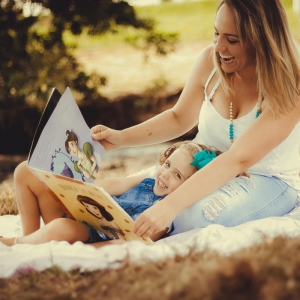
 Reading is not just about the words on the page; it’s also about the quality time you spend together. The connection you build during reading sessions is priceless, fostering stronger bonds between you and your child.
Reading is not just about the words on the page; it’s also about the quality time you spend together. The connection you build during reading sessions is priceless, fostering stronger bonds between you and your child.
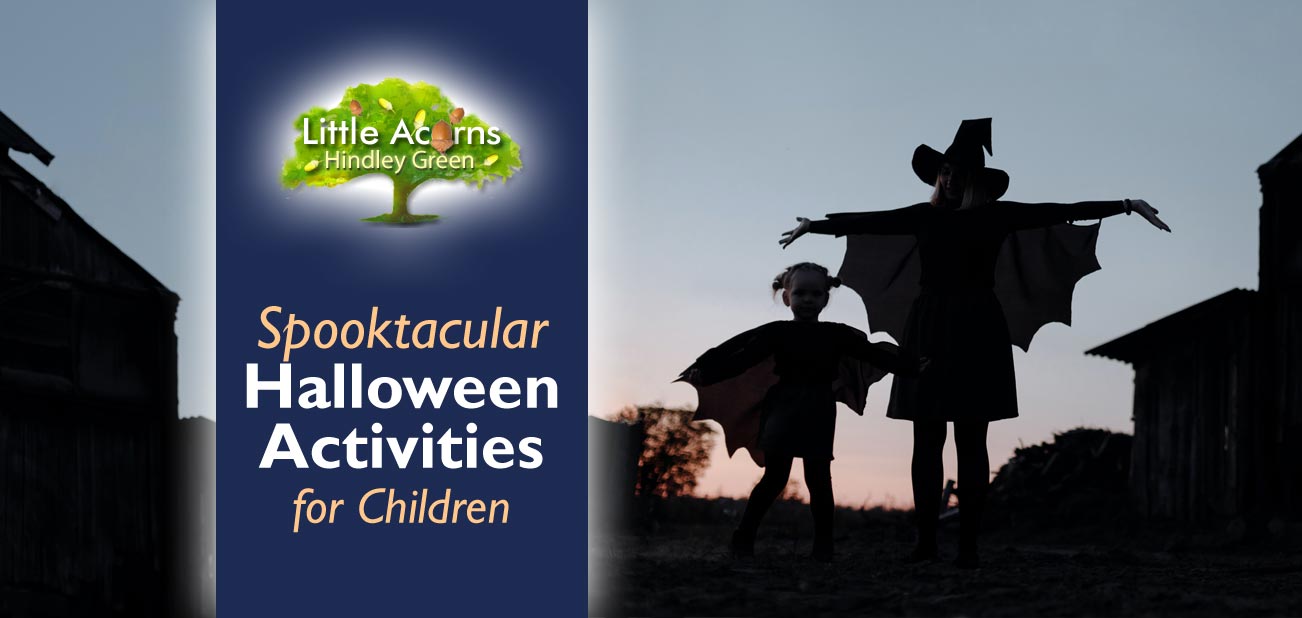
 Autumn’s arrival means that Halloween is just around the corner, coming on the 31st of October each year. The run-up to that date is a great time to start preparing for some fun Halloween activities for children to take part in. Whether dressing up for Halloween-themed parties, putting carved pumpkin lanterns and spooky decorations out at night, or playing Trick or treat locally, children of all ages will find Halloween a time of unique fun! It’s also a great opportunity for children to strengthen bonds with friends and for families to start getting creative! With that in mind, here are our top picks for spooktacular Halloween activities for kids!
Autumn’s arrival means that Halloween is just around the corner, coming on the 31st of October each year. The run-up to that date is a great time to start preparing for some fun Halloween activities for children to take part in. Whether dressing up for Halloween-themed parties, putting carved pumpkin lanterns and spooky decorations out at night, or playing Trick or treat locally, children of all ages will find Halloween a time of unique fun! It’s also a great opportunity for children to strengthen bonds with friends and for families to start getting creative! With that in mind, here are our top picks for spooktacular Halloween activities for kids! Dressing up in Halloween costumes is hugely popular amongst children. While purchasing costumes from stores is quick and easy, encouraging children to make their own Halloween costumes (with adult supervision) is likely to be not only cheaper but also much more fun. They’ll also be able to get creative and learn new skills in the process.
Dressing up in Halloween costumes is hugely popular amongst children. While purchasing costumes from stores is quick and easy, encouraging children to make their own Halloween costumes (with adult supervision) is likely to be not only cheaper but also much more fun. They’ll also be able to get creative and learn new skills in the process. Kids will also love dressing up as spiders. All they need is some black tights — or a pair of skinny trousers — and a black top that’s belted at the waist and then stuffed to make the ‘spider body’ fat. Extra spider legs can be made by stuffing more black tights and attaching them to the belt.
Kids will also love dressing up as spiders. All they need is some black tights — or a pair of skinny trousers — and a black top that’s belted at the waist and then stuffed to make the ‘spider body’ fat. Extra spider legs can be made by stuffing more black tights and attaching them to the belt. Your children can take this a step further and add Halloween-themed food into the mix, so there’s something to nibble too!
Your children can take this a step further and add Halloween-themed food into the mix, so there’s something to nibble too! The Halloween tradition of ‘tick or treating’ has its roots in Medieval times. It is a playful remnant of the practice of “souling,” where the poor would go door-to-door during what was then known as ‘Allhallowtide’ (around All Saints’ Day and All Souls’ Day) asking for food in exchange for prayers for the deceased. Over the years, this evolved into what we now know as Trick or treat. Children, usually in full Halloween fancy dress, knock on neighbourhood doors and say Trick or treat? Then, homeowners typically give them sweets or other treats — or become the target of a playful trick from the children! It’s great fun for little ones, especially if one or more neighbourhood parents can organise the evening in advance. By doing so, the neighbours are warned and can opt out if they prefer. In this way, lots of fun, laughter and treats will ensue and nobody gets a trick that they weren’t expecting!
The Halloween tradition of ‘tick or treating’ has its roots in Medieval times. It is a playful remnant of the practice of “souling,” where the poor would go door-to-door during what was then known as ‘Allhallowtide’ (around All Saints’ Day and All Souls’ Day) asking for food in exchange for prayers for the deceased. Over the years, this evolved into what we now know as Trick or treat. Children, usually in full Halloween fancy dress, knock on neighbourhood doors and say Trick or treat? Then, homeowners typically give them sweets or other treats — or become the target of a playful trick from the children! It’s great fun for little ones, especially if one or more neighbourhood parents can organise the evening in advance. By doing so, the neighbours are warned and can opt out if they prefer. In this way, lots of fun, laughter and treats will ensue and nobody gets a trick that they weren’t expecting! Many towns and villages will have ‘pumpkin patches’ during October. These are typically found on local farms and similar that set a field aside, chock-full of pumpkins. Families can come along and children will be able to scour the field and pick their favourite pumpkin. They can take it home in exchange, usually, for an affordable fee. Such pumpkin patches often also have wonderful photo opportunities where children can pose amongst pumpkin displays. In this way, children enjoy a morning or afternoon activity at the farm and end up with a hand-picked pumpkin too.
Many towns and villages will have ‘pumpkin patches’ during October. These are typically found on local farms and similar that set a field aside, chock-full of pumpkins. Families can come along and children will be able to scour the field and pick their favourite pumpkin. They can take it home in exchange, usually, for an affordable fee. Such pumpkin patches often also have wonderful photo opportunities where children can pose amongst pumpkin displays. In this way, children enjoy a morning or afternoon activity at the farm and end up with a hand-picked pumpkin too.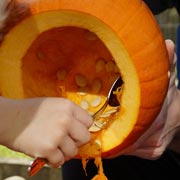 Hollowing out and carving spooky and creative faces into pumpkins is a classic Halloween activity enjoyed by thousands of families each year. For safety purposes, supervising adults will need to do any carving, though, as it’ll likely involve the use of a sharp knife. They can also loosen the seeds and flesh and then, if able, children can help to scoop it out. Once hollowed out and eyes, nose and mouth have been carved, children can have great fun decorating the outside and turning the pumpkin into a lantern using tea lights (again, under adult supervision or using LED lights for safety purposes). Nothing quite says ‘Halloween’ like a pumpkin face that glows in the garden at night. Children will naturally love the whole experience, end result, and feeling of accomplishment associated with this activity.
Hollowing out and carving spooky and creative faces into pumpkins is a classic Halloween activity enjoyed by thousands of families each year. For safety purposes, supervising adults will need to do any carving, though, as it’ll likely involve the use of a sharp knife. They can also loosen the seeds and flesh and then, if able, children can help to scoop it out. Once hollowed out and eyes, nose and mouth have been carved, children can have great fun decorating the outside and turning the pumpkin into a lantern using tea lights (again, under adult supervision or using LED lights for safety purposes). Nothing quite says ‘Halloween’ like a pumpkin face that glows in the garden at night. Children will naturally love the whole experience, end result, and feeling of accomplishment associated with this activity. Families can combine all or just some of these Halloween activities into one event by hosting their very own Halloween party for friends, relatives and neighbours. With spooky fancy dress costumes, Halloween-themed decorations, flickering pumpkin lanterns, and themed food and drinks, it’s sure to be huge fun and a spooktacular evening for everyone! Ghostly music and ghoulish games can be added to the event too, perhaps along with a period where children and adults can tell spooky stories and ghost tales. What’s not to love?
Families can combine all or just some of these Halloween activities into one event by hosting their very own Halloween party for friends, relatives and neighbours. With spooky fancy dress costumes, Halloween-themed decorations, flickering pumpkin lanterns, and themed food and drinks, it’s sure to be huge fun and a spooktacular evening for everyone! Ghostly music and ghoulish games can be added to the event too, perhaps along with a period where children and adults can tell spooky stories and ghost tales. What’s not to love?

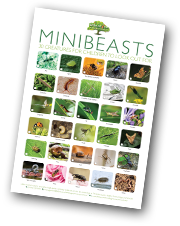 Today’s ‘Discover Minibeasts’ post is the third in our series of nature-based activities for children. And, as with the
Today’s ‘Discover Minibeasts’ post is the third in our series of nature-based activities for children. And, as with the 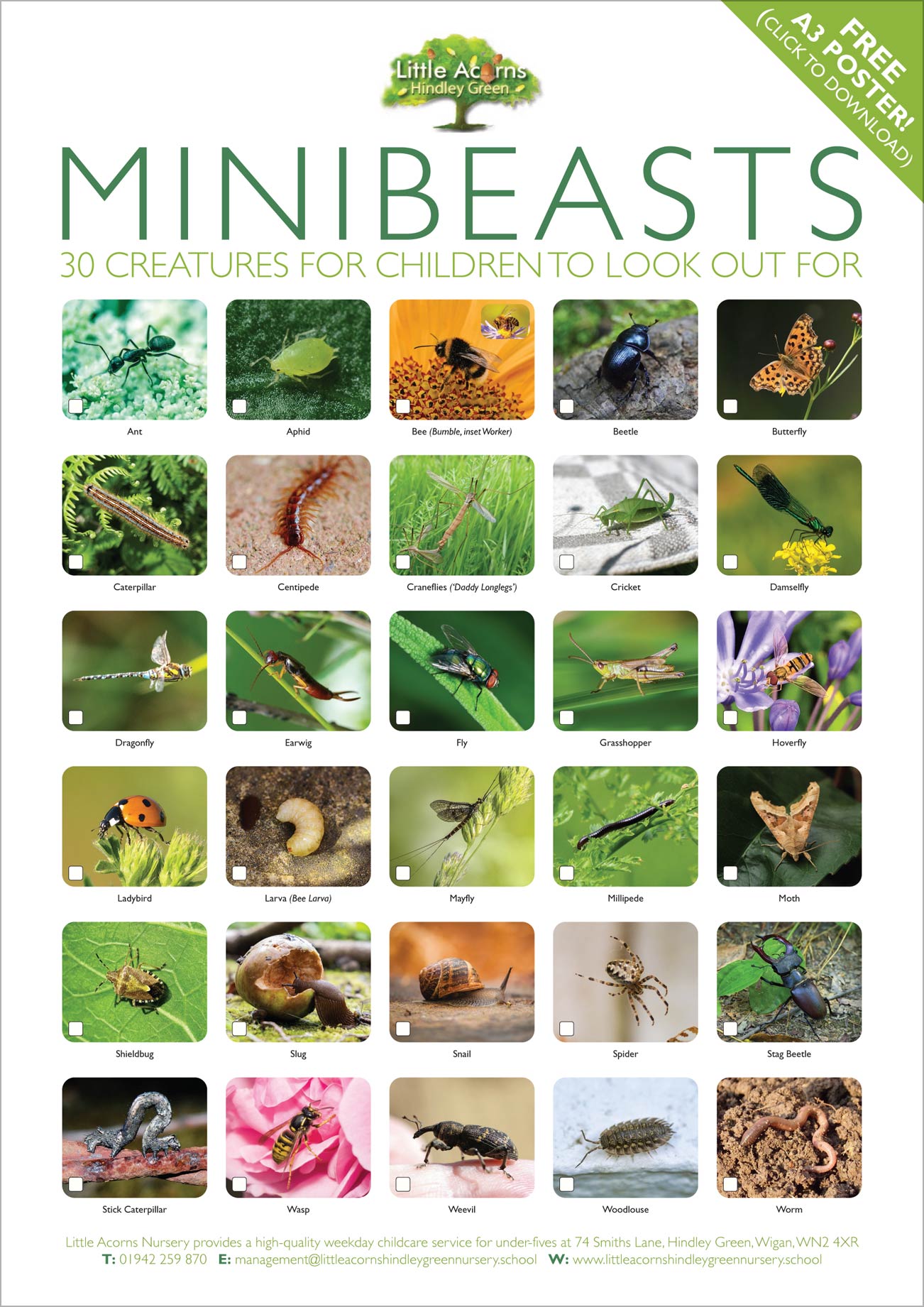
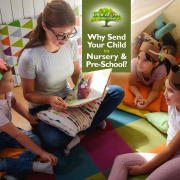
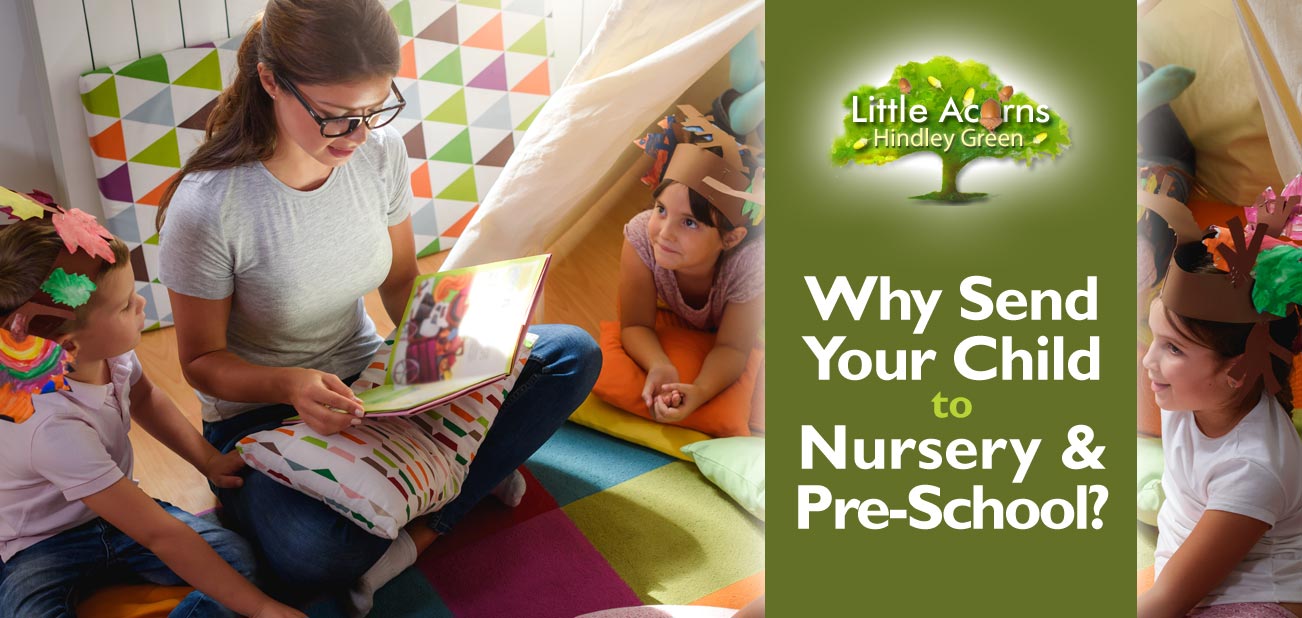
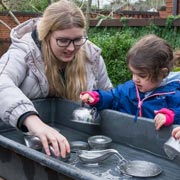 Some may be surprised to learn that nurseries/pre-schools like Little Acorns are not simply “childcare services”. We’re way more than just a crèche, playgroup or a group of nannies or childminders. In reality, our services extend way beyond simply looking after children while parents go to work, although of course we do that too. The truth is that we benefit little ones and their families in a whole range of additional, often profound, ways and that’s what we look at today.
Some may be surprised to learn that nurseries/pre-schools like Little Acorns are not simply “childcare services”. We’re way more than just a crèche, playgroup or a group of nannies or childminders. In reality, our services extend way beyond simply looking after children while parents go to work, although of course we do that too. The truth is that we benefit little ones and their families in a whole range of additional, often profound, ways and that’s what we look at today.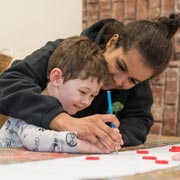 First of all, a Key Person will be allocated to your child on Day 1 when they start at the nursery. The Key Person is a childcare professional that will look out for the child’s wellbeing in all manner of different ways. One of the most important is in the monitoring of the little one’s progress in terms of learning and development. From the day they help to settle the child into the nursery to the day they leave for school, the child’s Key Person will be there to ensure that all the child’s individual needs are being met and that they are fulfilling their fullest potential in every area. Part of that will be the oversight of the bespoke early years education programme, which we’ll come to next.
First of all, a Key Person will be allocated to your child on Day 1 when they start at the nursery. The Key Person is a childcare professional that will look out for the child’s wellbeing in all manner of different ways. One of the most important is in the monitoring of the little one’s progress in terms of learning and development. From the day they help to settle the child into the nursery to the day they leave for school, the child’s Key Person will be there to ensure that all the child’s individual needs are being met and that they are fulfilling their fullest potential in every area. Part of that will be the oversight of the bespoke early years education programme, which we’ll come to next. At Little Acorns Nursery, a bespoke early years learning and development programme will be designed and implemented to suit the strengths and any challenges for each individual child. This is orchestrated by the child’s Key Person and nursery staff and, where needed, through cooperation with any external professionals, e.g. for children that have any special educational or developmental needs. The learning and development programme is tailored to them and them only. Using this approach bolsters the child’s stronger areas, so they can be further strengthened, and addresses any weaker areas that may require extra focus. It is also adapted as time goes by, as progress is made by the child. In this way, every child gets to achieve personal bests and optimal outcomes in every area of their learning and development.
At Little Acorns Nursery, a bespoke early years learning and development programme will be designed and implemented to suit the strengths and any challenges for each individual child. This is orchestrated by the child’s Key Person and nursery staff and, where needed, through cooperation with any external professionals, e.g. for children that have any special educational or developmental needs. The learning and development programme is tailored to them and them only. Using this approach bolsters the child’s stronger areas, so they can be further strengthened, and addresses any weaker areas that may require extra focus. It is also adapted as time goes by, as progress is made by the child. In this way, every child gets to achieve personal bests and optimal outcomes in every area of their learning and development. All of this nurturing, education and facilitation of their personal development does one other crucial thing too; it sets them up well for when they leave us around the age of five to start at primary school. By giving them the skills and tools they will need in every area, they are in a better position to absolutely thrive once they start school, right from day one. Indeed, many studies have shown that children who receive a good early years education go on to be higher achievers both at school and in their working lives. That’s gold dust, right there. Let’s take a closer look …
All of this nurturing, education and facilitation of their personal development does one other crucial thing too; it sets them up well for when they leave us around the age of five to start at primary school. By giving them the skills and tools they will need in every area, they are in a better position to absolutely thrive once they start school, right from day one. Indeed, many studies have shown that children who receive a good early years education go on to be higher achievers both at school and in their working lives. That’s gold dust, right there. Let’s take a closer look … One of the exciting things we have planned for Little Acorns Nursery in Hindley Green is the introduction soon of our own Forest School. Once up and running, it’ll give our nursery and pre-school children unparalleled access to nature and the natural world. They’ll be able to learn and benefit from nature in an incredible array of ways (and that’s important). So, watch this space for more details in due course.
One of the exciting things we have planned for Little Acorns Nursery in Hindley Green is the introduction soon of our own Forest School. Once up and running, it’ll give our nursery and pre-school children unparalleled access to nature and the natural world. They’ll be able to learn and benefit from nature in an incredible array of ways (and that’s important). So, watch this space for more details in due course. ‘Hygge’, pronounced ‘Hue-gah’, is another exciting initiative happening at Little Acorns Nursery in Hindley Green. If you’ve not heard of it, rest assured that it’s something that children will absolutely love and will benefit them in many ways. It’s also something that we’ll be pioneering in the area, so you may not find it in other nurseries and pre-schools around Wigan right now.
‘Hygge’, pronounced ‘Hue-gah’, is another exciting initiative happening at Little Acorns Nursery in Hindley Green. If you’ve not heard of it, rest assured that it’s something that children will absolutely love and will benefit them in many ways. It’s also something that we’ll be pioneering in the area, so you may not find it in other nurseries and pre-schools around Wigan right now.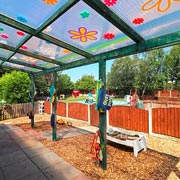 Everything at Little Acorns Nursery is there for a reason. It’s all been carefully brainstormed, pre-planned and implemented with utmost care. Whether it’s the introduction of Hygge, the opening of our Forest School, the addition of a new piece of equipment or the purchasing of a specific toy or learning device, everything at Little Acorns has a purpose and is there to benefit the children.
Everything at Little Acorns Nursery is there for a reason. It’s all been carefully brainstormed, pre-planned and implemented with utmost care. Whether it’s the introduction of Hygge, the opening of our Forest School, the addition of a new piece of equipment or the purchasing of a specific toy or learning device, everything at Little Acorns has a purpose and is there to benefit the children. Parents of children at Little Acorns Nursery also give us great feedback about the wonderful childcare provision at the setting. Browse the site for full examples of parent feedback received (it’s scattered around the site) but, to give you a taster, comments include, “My girls absolutely adore this nursery but most of all they adore the staff”, “thank-you for the bottom of my heart for what you have done for my girls”, “I couldn’t recommend this nursery enough, they care and love the children like their own and I couldn’t of ever felt more comfortable leaving my children with a nicer set of girls.”, “I would not hesitate to recommend this nursery to anyone!”, “You should all be very proud of the work you do. It really means so much to us every time we see those small steps forward and we appreciate it.”, and “If I ever had any more children, without a doubt they will be coming to this nursery even if I moved 500 miles away!”.
Parents of children at Little Acorns Nursery also give us great feedback about the wonderful childcare provision at the setting. Browse the site for full examples of parent feedback received (it’s scattered around the site) but, to give you a taster, comments include, “My girls absolutely adore this nursery but most of all they adore the staff”, “thank-you for the bottom of my heart for what you have done for my girls”, “I couldn’t recommend this nursery enough, they care and love the children like their own and I couldn’t of ever felt more comfortable leaving my children with a nicer set of girls.”, “I would not hesitate to recommend this nursery to anyone!”, “You should all be very proud of the work you do. It really means so much to us every time we see those small steps forward and we appreciate it.”, and “If I ever had any more children, without a doubt they will be coming to this nursery even if I moved 500 miles away!”. 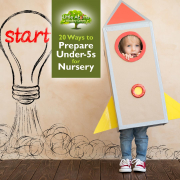

 Starting nursery or pre-school is a real milestone for children and parents alike. As well as being exciting, though, transitioning to nursery or pre-school can be daunting for the little ones. The researching of childcare settings, checking Ofsted reports and appraising recommendations from friends is all very well, but that’s only the first step. The transition will be smoother for the children themselves if a few golden rules are followed. That’s precisely where today’s guide comes in, with our 20 Ways to Prepare Under-5s for Nursery. Take a look.
Starting nursery or pre-school is a real milestone for children and parents alike. As well as being exciting, though, transitioning to nursery or pre-school can be daunting for the little ones. The researching of childcare settings, checking Ofsted reports and appraising recommendations from friends is all very well, but that’s only the first step. The transition will be smoother for the children themselves if a few golden rules are followed. That’s precisely where today’s guide comes in, with our 20 Ways to Prepare Under-5s for Nursery. Take a look. Arrange a visit of your chosen or short-listed nurseries/pre-schools. Good settings (like Little Acorns Nursery) will be happy to give you and your child a guided tour. It’s best to go during an actual session, so that you can both see the setting in action on a standard day. Bear in mind that it can also be a chance for your child to become more familiar with the setting. If they later go on to start at the nursery, they will then already be aware of what the rooms look like, where the toilets are, who their carers are, and so on. Show them the play areas inside and out and let them see the other children having fun.
Arrange a visit of your chosen or short-listed nurseries/pre-schools. Good settings (like Little Acorns Nursery) will be happy to give you and your child a guided tour. It’s best to go during an actual session, so that you can both see the setting in action on a standard day. Bear in mind that it can also be a chance for your child to become more familiar with the setting. If they later go on to start at the nursery, they will then already be aware of what the rooms look like, where the toilets are, who their carers are, and so on. Show them the play areas inside and out and let them see the other children having fun. There are several things you can also do around preparing your child for eating at nursery/pre-school. For starters, get your little one used to eating in a group of other children — perhaps with friends or related children at first. Also practise cutlery skills with your child, so they’re more able to eat independently when they start.
There are several things you can also do around preparing your child for eating at nursery/pre-school. For starters, get your little one used to eating in a group of other children — perhaps with friends or related children at first. Also practise cutlery skills with your child, so they’re more able to eat independently when they start. Pre-joining visits and settling-in sessions are a great way for children to make friends at the setting, but parents can also orchestrate this outside of the nursery or pre-school. For example, by finding out which friends and neighbours send their children to the setting, they can then suggest some play dates with those children. Little ones will then see one or more friendly little faces welcoming them, right from the outset, once they start at the setting. It’s a good opportunity for children to learn the art of socialising. It’s also good for parents to network in this way, so they can compare notes and perhaps pool information they might otherwise have missed.
Pre-joining visits and settling-in sessions are a great way for children to make friends at the setting, but parents can also orchestrate this outside of the nursery or pre-school. For example, by finding out which friends and neighbours send their children to the setting, they can then suggest some play dates with those children. Little ones will then see one or more friendly little faces welcoming them, right from the outset, once they start at the setting. It’s a good opportunity for children to learn the art of socialising. It’s also good for parents to network in this way, so they can compare notes and perhaps pool information they might otherwise have missed. Whether your child is potty/toilet trained or still in nappies, teach them to help themselves in this type of area. If they are not yet toilet trained and are ready for it, begin to teach them. It’ll stand them in better stead once they start at nursery/pre-school. If they are newly toilet trained, though, reinforce that accidents do happen and that the childcare staff are used to it and will help change them if so.
Whether your child is potty/toilet trained or still in nappies, teach them to help themselves in this type of area. If they are not yet toilet trained and are ready for it, begin to teach them. It’ll stand them in better stead once they start at nursery/pre-school. If they are newly toilet trained, though, reinforce that accidents do happen and that the childcare staff are used to it and will help change them if so. A little independence will go a long way for them once children start at nursery or pre-school. Personal hygiene and toilet training is just one of many things they can help themselves with if they’re shown how.
A little independence will go a long way for them once children start at nursery or pre-school. Personal hygiene and toilet training is just one of many things they can help themselves with if they’re shown how. Childcare providers are more than just babysitters or a crèche. Settings like Little Acorn Nursery and many others offer a full early years education too. It’s very high quality, covering pretty much every aspect of early years learning and development and the all-important
Childcare providers are more than just babysitters or a crèche. Settings like Little Acorn Nursery and many others offer a full early years education too. It’s very high quality, covering pretty much every aspect of early years learning and development and the all-important  In the month or weeks leading up to your child’s start date, it’s a great idea to try to mimic the timings at the nursery, so that the routine is pre-embedded. So, try to get them used to getting up and getting dressed etc. at the same time as the nursery and they can even have a restful nap at the same time as nap sessions at the setting. An appropriate bedtime routine is also important, so that your child is energised and not tired once they begin at the nursery.
In the month or weeks leading up to your child’s start date, it’s a great idea to try to mimic the timings at the nursery, so that the routine is pre-embedded. So, try to get them used to getting up and getting dressed etc. at the same time as the nursery and they can even have a restful nap at the same time as nap sessions at the setting. An appropriate bedtime routine is also important, so that your child is energised and not tired once they begin at the nursery. Ensure that you are familiar with the pick-up and drop-off times as well as the nursery’s security arrangements should someone else be picking your child up instead of you.
Ensure that you are familiar with the pick-up and drop-off times as well as the nursery’s security arrangements should someone else be picking your child up instead of you. When the big day arrives for your child, don’t let on if you’re anxious or sad otherwise your child may pick up on it and become upset. So, keep it casual and don’t make a fuss when you drop them off for the first time. Staff and any friends they’ve previously made as part of your planning above are sure to welcome them. Chances are, they’ll run off into the nursery with a friend and have great fun right away anyway!
When the big day arrives for your child, don’t let on if you’re anxious or sad otherwise your child may pick up on it and become upset. So, keep it casual and don’t make a fuss when you drop them off for the first time. Staff and any friends they’ve previously made as part of your planning above are sure to welcome them. Chances are, they’ll run off into the nursery with a friend and have great fun right away anyway!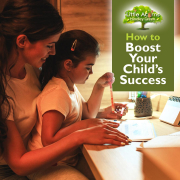
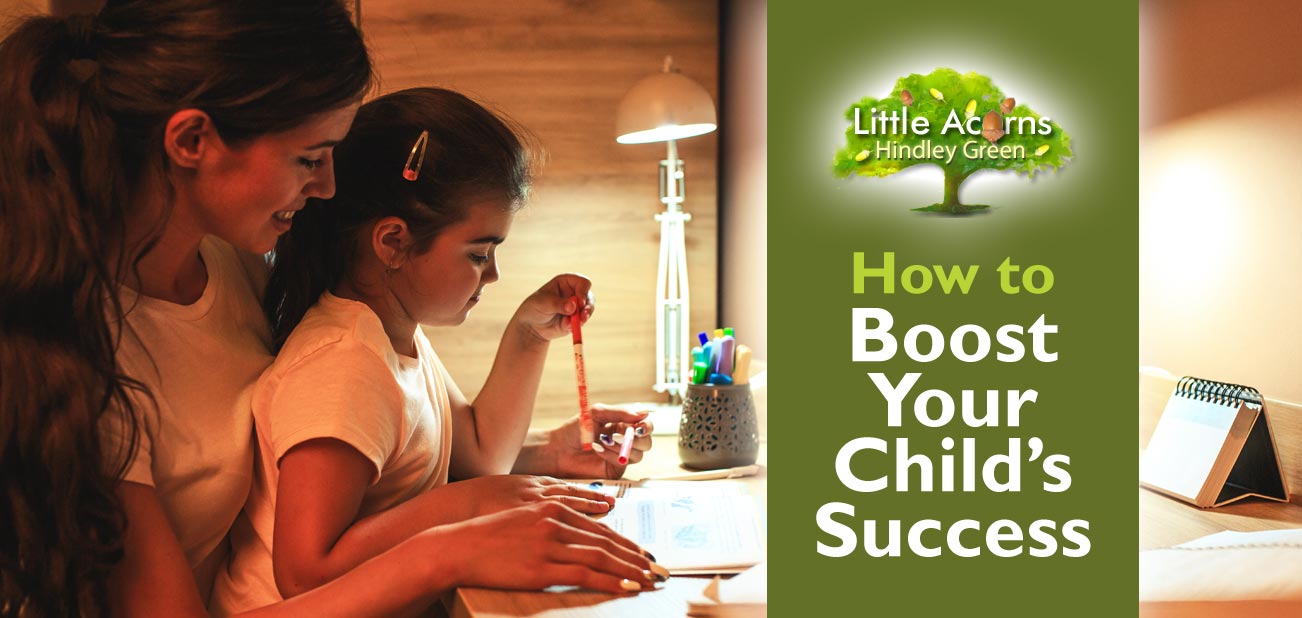
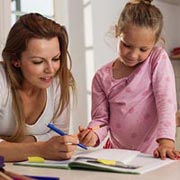 What’s more, the boost in the child’s success is clear to see at all stages — in the short term, medium term and long term — right into adulthood. When parents are actively involved in a child’s education, that child will do better at nursery and pre-school, achieve better grades at school and go on to have more success in higher education and, ultimately, in their careers. It’s incredible, therefore, just how powerful proactive parental involvement in a child’s education can be. Let’s take a closer look at the findings.
What’s more, the boost in the child’s success is clear to see at all stages — in the short term, medium term and long term — right into adulthood. When parents are actively involved in a child’s education, that child will do better at nursery and pre-school, achieve better grades at school and go on to have more success in higher education and, ultimately, in their careers. It’s incredible, therefore, just how powerful proactive parental involvement in a child’s education can be. Let’s take a closer look at the findings.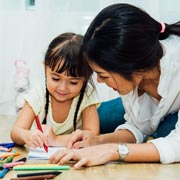 The studies conclude that parents can help children — and boost their potential for success — in several impactful ways. We have picked out a few of the most powerful and easy-to-accomplish ways below.
The studies conclude that parents can help children — and boost their potential for success — in several impactful ways. We have picked out a few of the most powerful and easy-to-accomplish ways below. To illustrate that point, just reading with them regularly can boost their language skills by a staggering 20% (we’ll write a separate post about the benefits of reading with children in due course).
To illustrate that point, just reading with them regularly can boost their language skills by a staggering 20% (we’ll write a separate post about the benefits of reading with children in due course). This is all backed up by
This is all backed up by 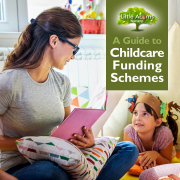
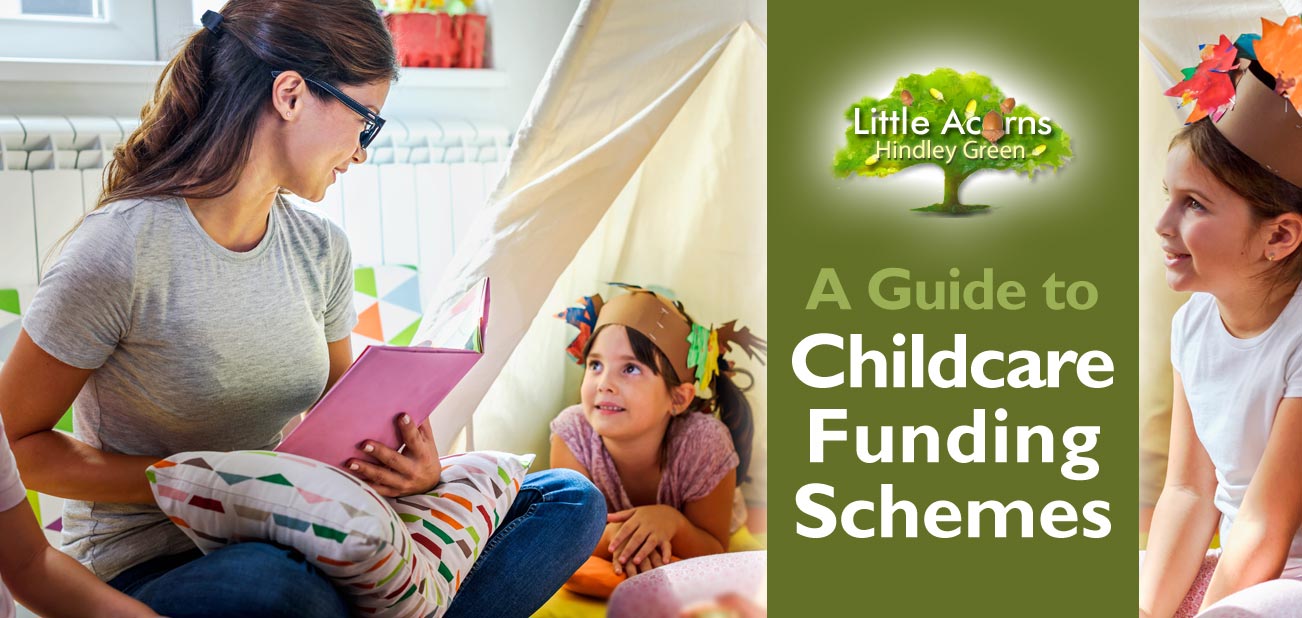
 There are lots of free or assisted funding schemes for childcare and these are especially useful to parents looking to keep childcare costs down. With increased inflation and the cost of living crisis in Britain, such schemes have probably never been more welcome. Today we’ll take a condensed look at the main childcare funding options available to parents, particularly those of children under five, although many schemes also help children substantially older.
There are lots of free or assisted funding schemes for childcare and these are especially useful to parents looking to keep childcare costs down. With increased inflation and the cost of living crisis in Britain, such schemes have probably never been more welcome. Today we’ll take a condensed look at the main childcare funding options available to parents, particularly those of children under five, although many schemes also help children substantially older. Although the Childcare Vouchers Scheme closed to new applicants on 4th October 2018, childcare vouchers are still available to those who enrolled before the deadline, so long as they continue to meet eligibility requirements. For those that do, childcare vouchers help to cut the cost of childcare for children aged up to 15, or 16 if they are disabled.
Although the Childcare Vouchers Scheme closed to new applicants on 4th October 2018, childcare vouchers are still available to those who enrolled before the deadline, so long as they continue to meet eligibility requirements. For those that do, childcare vouchers help to cut the cost of childcare for children aged up to 15, or 16 if they are disabled.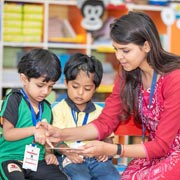 Tax-Free Childcare is a great, UK-wide, scheme that many working families will be eligible for, even including relatively high earners. What’s more, it could save them as much as £2,000 in childcare fees each year, per child, rising to £4,000 if their child has a disability.
Tax-Free Childcare is a great, UK-wide, scheme that many working families will be eligible for, even including relatively high earners. What’s more, it could save them as much as £2,000 in childcare fees each year, per child, rising to £4,000 if their child has a disability.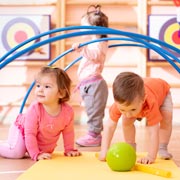 Certain children aged 2 in England* are eligible for 570 hours of totally free childcare per year. This is a great opportunity for them to begin their early years education relatively young and indeed the age of 2 is a crucial age to do so, according to studies. The substantial free funding is usually taken as 15 hours of free childcare over 38 weeks of the year, although some childcare settings allow it to be spread out in a different way. Not all 2-year-olds are eligible, however, and basically it comes down to the fact that the parent(s) must be in receipt of Government benefits of some kind. Other 2-year-olds are eligible for additional reasons, for example because they are looked after by the local authority or are subject to an Education, Health and Care (ECH) Plan. Even some non-UK citizens who do not claim benefits have eligible 2-year-olds although, as with all these scenarios, various rules around eligibility apply.
Certain children aged 2 in England* are eligible for 570 hours of totally free childcare per year. This is a great opportunity for them to begin their early years education relatively young and indeed the age of 2 is a crucial age to do so, according to studies. The substantial free funding is usually taken as 15 hours of free childcare over 38 weeks of the year, although some childcare settings allow it to be spread out in a different way. Not all 2-year-olds are eligible, however, and basically it comes down to the fact that the parent(s) must be in receipt of Government benefits of some kind. Other 2-year-olds are eligible for additional reasons, for example because they are looked after by the local authority or are subject to an Education, Health and Care (ECH) Plan. Even some non-UK citizens who do not claim benefits have eligible 2-year-olds although, as with all these scenarios, various rules around eligibility apply.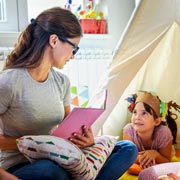 In contrast to the above, 15 hours of free funding is available for all families in England* with a child aged 3 to 4 requiring childcare. As with the above, the children can get 570 hours of free childcare per year except this time only while they’re 3 or 4. This is again usually spread out as 15 hours per week over the course of 38 weeks, however some childcare providers will allow a different pattern. It really is a no-brainer and is a great way to get children into early years education and perhaps parents back into the workplace. Children are eligible to start from the term following their 3rd birthday until they start in Reception Year at school, or reach ‘compulsory school age’ if that’s later.
In contrast to the above, 15 hours of free funding is available for all families in England* with a child aged 3 to 4 requiring childcare. As with the above, the children can get 570 hours of free childcare per year except this time only while they’re 3 or 4. This is again usually spread out as 15 hours per week over the course of 38 weeks, however some childcare providers will allow a different pattern. It really is a no-brainer and is a great way to get children into early years education and perhaps parents back into the workplace. Children are eligible to start from the term following their 3rd birthday until they start in Reception Year at school, or reach ‘compulsory school age’ if that’s later. The “30 Hours” childcare scheme for 3 and 4-year-olds is a little harder to obtain because families are not eligible where one partner earns £100k or more. Additionally, the parent and their partner, if they have one, must usually expect to earn at least £152 per week, on average, in order to qualify, although the figures are lower for parents younger than 23. You may still qualify for the free childcare funding if you are on maternity leave, paternity leave, shared leave, adoption leave, or are a carer. Rules apply. As with the Tax-Free Childcare scheme, you have to ensure your details are kept up-to-date every quarter in order to check that you’re still eligible. Your child must usually live with you too, in order to qualify. However, as with all these things, there are some exceptions to the core rules.
The “30 Hours” childcare scheme for 3 and 4-year-olds is a little harder to obtain because families are not eligible where one partner earns £100k or more. Additionally, the parent and their partner, if they have one, must usually expect to earn at least £152 per week, on average, in order to qualify, although the figures are lower for parents younger than 23. You may still qualify for the free childcare funding if you are on maternity leave, paternity leave, shared leave, adoption leave, or are a carer. Rules apply. As with the Tax-Free Childcare scheme, you have to ensure your details are kept up-to-date every quarter in order to check that you’re still eligible. Your child must usually live with you too, in order to qualify. However, as with all these things, there are some exceptions to the core rules.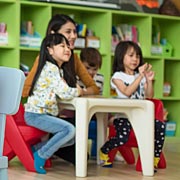 If you are a student as well as being a parent, you may be eligible for some childcare support through a variety of funding schemes.
If you are a student as well as being a parent, you may be eligible for some childcare support through a variety of funding schemes.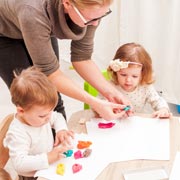 If you and your partner, if you have one, claim Universal Credit, are working and have a child under the age of 17, you may be able to claim back as much as 85% of your childcare costs if eligible. In order to claim, various rules apply and there are even some exceptions to the above. For example, those not working through ill health or disability may still be eligible in some circumstances. You must not, however, be claiming Tax-Free Childcare nor Tax Credits in order to receive childcare funding through Universal Credit.
If you and your partner, if you have one, claim Universal Credit, are working and have a child under the age of 17, you may be able to claim back as much as 85% of your childcare costs if eligible. In order to claim, various rules apply and there are even some exceptions to the above. For example, those not working through ill health or disability may still be eligible in some circumstances. You must not, however, be claiming Tax-Free Childcare nor Tax Credits in order to receive childcare funding through Universal Credit. Childcare funding through Universal Credit has replaced the Tax Credits system, which closed to new applicants in February 2019. If you are not an existing Tax Credits customer, you will therefore need to claim under the Universal Credit scheme instead. However, for existing families who can still claim Tax Credits, they are able to claim as much as 70% of eligible childcare costs for a child under 16 (17 if disabled) up to a maximum of £122.50 per week for one child or £210 per week for more than one.
Childcare funding through Universal Credit has replaced the Tax Credits system, which closed to new applicants in February 2019. If you are not an existing Tax Credits customer, you will therefore need to claim under the Universal Credit scheme instead. However, for existing families who can still claim Tax Credits, they are able to claim as much as 70% of eligible childcare costs for a child under 16 (17 if disabled) up to a maximum of £122.50 per week for one child or £210 per week for more than one.